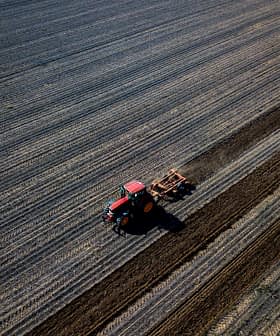Report: Staple Crop Yields Will Drop as Global Population Grows
Climate change is causing extensive damage to global agriculture. A new report warns that some of the worst impacts may be irreversible by 2030.
 Green rice fields on Bali island
Green rice fields on Bali islandClimate change is affecting global farming activities, reducing their current and future production capacity.
While human population growth is projected to continue through 2050 and almost 50 percent more food will be needed, agricultural yields might drop or even collapse with harsh consequences on all continents.
Climate change will shorten the months during which the crops usually produce their yields, therefore hitting the overall production capacity.
This is the scenario emerging from the latest Chatham House report, the data from which show that staple crop production may fall by 30 percent in the following decades, impacting food security for hundreds of million people and fueling price increases for billions.
The “Climate change risk assessment 2021” presented to governments worldwide hints at the fact that without immediate action for substantial greenhouse gas reduction, the impacts on agriculture will be devastating in a matter of years.
See Also:9.7 Billion Tons of Greenhouse Gas Emissions Come from Meat Production Each Year“The challenges come from multiple sources and scenarios as whole regions of the world are experiencing a climate crisis that will ultimately hit billions of people,” Daniel Quiggin, a senior research fellow with the environment and society program at Chatham House, told Olive Oil Times.
“As an example, during the next decade, at least 400 million people will not be able to work outside because of the too high temperatures,” he added. “That will have a dramatic impact on agriculture, and harvest yields might be destined to fall also because of that.”
The report considers the working hours lost in 2019 and 2020 due to the Covid-19 pandemic. It estimates that temperature increases led to the loss of at least 300 billion working hours in 2019 due to temperature increase, a 52-percent increase compared with data from 2000.
Devastating heatwaves, such as those experienced in Australia or Siberia, are now between 10 and 600 times more likely due to the changing climate. At least 3.9 billion people will be severely exposed to such heatwaves by 2040, resulting in 10 million deaths each year from excess heat.
“No region will be spared,” wrote the report’s authors. “By 2040, major heatwaves will be experienced each year by 50 percent or more of the populations in West, Central, East and Southern Africa, the Middle East, South and Southeast Asia, as well as Central America and Brazil.”
“By 2050, more than 70 percent of people in every region will experience heatwaves each year,” the report added. “Urban areas will suffer the greatest challenges of workability and survivability.”
From an agricultural standpoint, persistent droughts continue to threaten crop yields worldwide, including olives, wheat and coffee. Researchers believe that heatwaves and droughts have caused yield decreases of up to 50 percent in the worst years of the last decades.
While new technologies and research are helping many farmers better cope with the effects of the drought, experts believe that by 2040 at least 32 percent of global cropland will be affected by severe drought with enormous consequences on global food yields.
“Wheat and rice together make up 37 percent of global average calorific intake,” the report said. “By 2050, more than 35 percent of the global cropland used to grow both these crops will likely be exposed to damaging hot spells each year, causing reductions to yields.”
The other aspect that increasingly will impact agriculture in many regions is the reduced growing period for plants.
“Climate change will shorten the months during which the crops usually produce their yields, therefore hitting the overall production capacity,” Quiggin said. “Adding to this, during the shortened growing periods, the crops will also be more exposed to altered weather, so that the combination of multiple factors might determine a substantial decrease of farming capacity.”
See Also:Ahead of Climate Summit, African Leaders Discuss Fate of The ContinentSynchronous yield losses of 10 percent or more by the top four maize producing countries, wrote the Chatham House experts, “would have devastating impacts on availability and prices. Currently, there is a near-zero chance of this happening. However, over the decade of the 2040s, the risk of this increases to just under 50 percent.”
Current plans to counteract the impacts of climate change are far from sufficient, warned the report’s authors.
If the so-called National Determined Contributions (NDCs) announced by many governments are enacted effectively, the report said there is a less than five percent chance of keeping temperatures below 2 °C above pre-industrial levels. The possibility of reaching the 1.5 °C target set by the 2015 Paris Agreement is less than one percent.
“If policy ambition, low-carbon technology deployment and investment follow current trends, 2.7 °C of warming by the end of the century is the central estimate, relative to pre-industrial levels, but there is a 10 percent chance of warming of 3.5 °C,” the report warned.
“These projections assume that countries will meet their NDCs; if they fail to do so, the probability of extreme temperature increases is non-negligible,” the report added. “A global temperature increase greater than 5 °C should not be ruled out.”
“Should NDCs stay as they are, many of the feared climate change impacts will be locked in by 2040, so we actually have between five and 10 years to substantially cut the emissions,” Quiggin said. “Many of those impacts will go beyond what many countries will be able to adapt to, so mitigation strategies are essential.”
Mitigation includes plans for carbon capture, energy production, deforestation, soil preservation and fossil fuel reduction, wrote the Chatham House experts.
“The other front is adaptation strategies,” Quiggin said. “Even if we entirely decarbonized the global economy in the next 10 years, we would still have to adapt. That includes sustainable farming practices, such as implementing correct crop rotation patterns and the diversity of crops thus avoiding monoculture which are less resilient.”
Adaptation will also mean upgrading irrigation facilities in the drier areas.
“Still, many regions will be subjected to such an impact that their agriculture will not be able to adapt,” Quiggin said. “In those regions, many farmers and agricultural workers will have to find new jobs because farming will not be able to offer the opportunities it traditionally had opened to them.”
The Chatham House report will be among the data sources discussed during the upcoming international climate summit COP26 on October 31.








